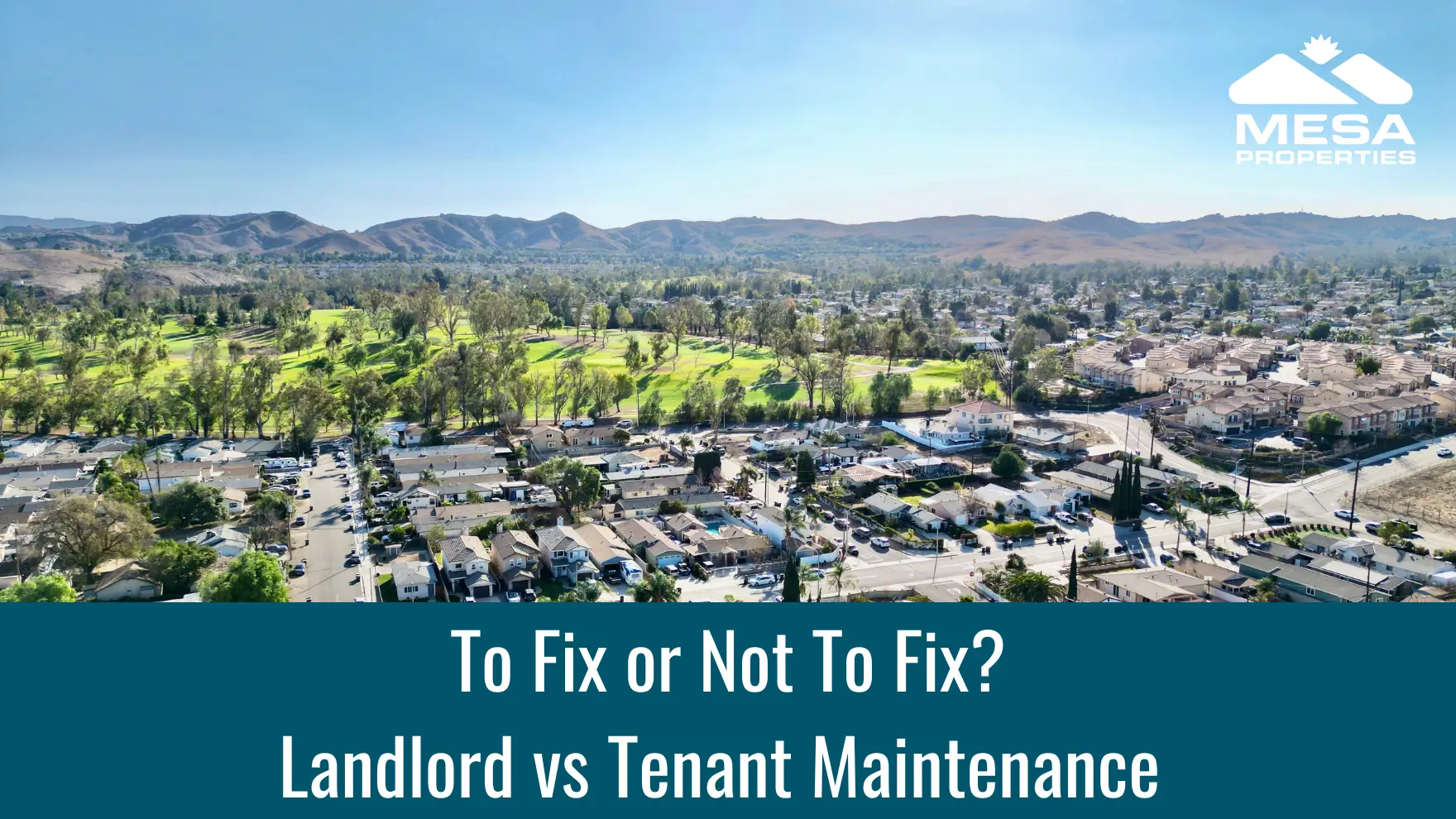With today’s sight on social media, the idea of friendly relations with a vast amount of people has become widely important within our functioning society. However, as wonderful as it may sound, we simply can’t “befriend” everyone worldwide (and nor would you want to, because that task is extremely daunting). Nevertheless, just because someone is not on your friends list doesn’t mean you still can’t be civil, friendly, and maintain a decent association with them. Given these relationship circumstances, one such affiliation comes to mind: Landlord and Tenant.
I doubt many of us are so chummy with our landlord, but that doesn’t mean we still can’t have good ties with them. Unfortunately, many of these relationships are disheveled when it comes down to pesky maintenance issues.
How are we to know who is responsible to fix what? This question alone has caused countless habitual problems in residential areas. Luckily you won’t need to wonder any longer because we have sorted through the “fix-it lists” when it comes to repairs as well as the “do’s and do nots” when it comes to addressing situations directly to your landlord.
The Unwritten Residential Code
Before we address who is responsible for what, it’s important to establish what the basic landlord/tenant relationship is based on, and simply put, it’s fueled by “habitability”.
Habitability is a term used to measure how livable the condition of your rented home is.
Whether you know it or not, when the landlord hands over your leasing paperwork, he/she is legally stating that the place you are renting is clearly and undeniably able to keep its residences secure and well housed.
It’s an unwritten contract and code of conduct. Therefore, if your living area is not “livable”, it is up to the landlord to fix the problem. Some of the basic maintenances that the property owner must fulfill are:
- Keeping basic structural elements of the building secure and up to code (floors, stairs, walls, roofs, etc.).
- Maintain common areas, like hallways and stairwells, safely and in a clean condition.
- Keep utilities (plumbing, heat, electrical systems, water, ventilation and air conditioning systems) operating safely.
- Supply cold and hot water at a reasonable temperature.
- Provide trash receptacles and arrange for garbage pick-up.
- Manage environmental toxins so they don’t pose a threat or danger.
- Provide relative safety and security from criminal intrusion.
- Exterminate rodent and vermin infestation (before the new resident moves in).
Before ever moving in, make sure all these elements are up to code. You are not under contract until the leasing paperwork is signed, so you can persuade the owner to take action of his property by not offering your business if these requirements are not met.
If you have any questions regarding your city’s, county’s, or state’s building codes and regulations, look:
- Online or in the local library to check your landlord-tenant statutes.
- Under the index of your state’s codes for landlord-tenant, such as “duty to maintain” or “repairs” subheadings.
- Or contact your state’s consumer protection agency.
Major vs. Minor Problems
Once you have moved into your habitable home, it is important to note what problems are major and minor within the function of your living area. No home, no matter how grand, ever comes nuance-free, so it’s vital to investigate exactly what situations you are dealing with.
Major problems are issues that conflict with a home’s habitability (AKA major problems allow for an unsafe living area). Some of these troubles may be, but are not limited to:
- Massive roof leaks
- Mildew in walls, floor, or ceiling
- Completely broken water heater
- Furnace that doesn’t work
- Front door that doesn’t lock or provide security
- Toilet that doesn’t flush in a one bathroom rental
- An unclean lobby area
- Broken heater or AC in the seasons when the appliance is needed
- Unsafe or toxic elements such as lead paint
All of these major issues are the absolute responsibility of the landlord to fix and maintain. A good test to see if your problem is deemed as “major” is to ask yourself, “Is this problem causing me fear for safety or make my rental unfit to live in?” If yes, odds are its a major problem, but if not, you may have a minor issue on your hands.
A minor problem, though sometimes very unattractive and annoying, is classified as something non-threatening to one’s safety and well-being. Even though chipped and faded paint is just horrendous, it typically still allows its residents to live in its ugly walls safely. Some minor problems may be, but are not limited to:
- A water heater that doesn’t provide hot water five degrees less than the required state law temperature
- A clanky furnace
- A screen door that doesn’t latch or is ripped
- Walls that need a new paint job
- Carpet that is severely stained
- A broken heater during the summer (or AC during the winter)
- Burnt out light bulbs
- Stained or rusted appliances (after the tenant moves in and that are not a part of a major plumbing piece)
All minor problems are up to the tenant to fix or replace, and even though it may be costly or inconvenient, as long as it’s not going against “habitability” codes, it is not the responsibility of the landlord to maintain.
A Few Tricky Situations
Sometimes it’s hard to know when you are responsible for problems that come up in your rental; for example, sometimes a shower head may break just two days after you move into your home, which may lead some landlords to put the blame and bill on you. But was it really your doing?
Some normal wear and tear is unavoidable and may have even been caused by a tenant living in the same area before you. Therefore, it’s important to make a list of issues of your rental as soon as you can and inform your landlord immediately so any concern can be addressed before it's put on your shoulders.
However, some problems still spring up, so it’s important to know what the responsibilities of a tenant are to hopefully sort out who is liable. The duties of a tenant, typically, are to:
- Keep the rental as clean and safe as possible given the condition of its environment.
- Dispose of garbage and other waste in a clean and safe manner.
- Keep plumbing as clean and safe as their conditions permit.
- Use utilities (plumbing, ventilation, sanitation, heating, air-conditioning, electrical elements, and other systems/facilities) properly and for what they were intended.
- Fix things you break or damage.
Therefore, if something becomes an issue while in the presence of the resident, the responsibility typically falls on the tenant. If the tenant puts a hole in the wall or causes a rat infestation because of their lack of cleanliness, the bill and responsibility is on them, not the landowner.
Addressing Your Problems to the Landlord or Tenant
It can be tricky bringing problems up to your landlord, or tenant for that matter because you want to maintain a decently respectable relationship between each other. However, you can be pushy and powerful while still being friendly and civil. If there is an issue that needs to be addressed between the landlord and tenant here are the best ways to go about doing it:
Written Note: A concern presented in writing is one of the best ways to address a situation if a verbal interaction isn’t working. A well-written letter will allow the recipient to think the content over before giving a quick, irrational answer. Not to mention, a letter is hard to forget about, so a written notice will surely move things along with haste and respect without being easily dismissed. In the letter, include what is wrong, why it is important to be fixed, what could possibly happen if it is not, and the estimate of the damage if possible. Providing as much information as feasible will help speed along the process and allow the recipient more details to mull over. Tenants: if you are writing to get something fixed that you feel you are not responsible for, please address why, but make sure your contract, building codes, and state laws legally back you up. Your claim will be dismissed if it’s simply established on moral principle.
Unbiased Mediation: If a written notice (or several attempts) go by unnoticed, perhaps more drastic measures need to be taken by meeting with a mediator. Invite the landlord (or tenant, depending on the situation) to meet with you and the mediator to discuss what is going on. The mediator will help you to provide a mutually acceptable solution through open discussion. Many communities offer free or low-cost mediation services as an alternative to going to court.
Report the Person to the Local Building/Housing Agency: If the tenant or landlord is not upholding their end of the contract or building codes, and legal issues may be at hand, contact your local housing agent. These agents can be found under your city’s or county’s government listings and can help explain whether your problem violates codes. Hopefully, the lawful scare encourages your landlord or tenant to be “the bigger man” and take care of the problem knowing the legality of the issue.
Sue in a Claims Court: If absolutely nothing is being done to address your situation, the last resort it to sue. If you can prove that the problem at hand is legally a concern or decreases the value of your property, a judge can award monetary value to the persecution or charge the defense with legal fees.
Obviously some of these measures may hurt the relationship between the owner and tenant, but sometimes drastic measures are needed if someone is not holding up their end of the contract.
Any relationship is important because it means civil respect and kindness between two people, and this includes tenant-landlord relations. Just because you are not friends with your landlord doesn’t mean you still can’t be friendly towards them. After all, they are the one putting a roof over your head.
However, issues always arise so it’s important to know how to handle yourself in these situations. Hopefully now, you can feel fully capable taking on any “fix it” ticket when it comes to your rental.
Nevertheless, if you still have questions or concerns regarding your tenant-landlord relationship, please feel free to contact us at Mesa Property Management or call (866)679-1730. We are trained in handling any sticky situation that may arise and can help manage your budding rental relations.
Special thanks to NOLO for providing all legal information regarding Landlord and Tenant Responsibilities.



